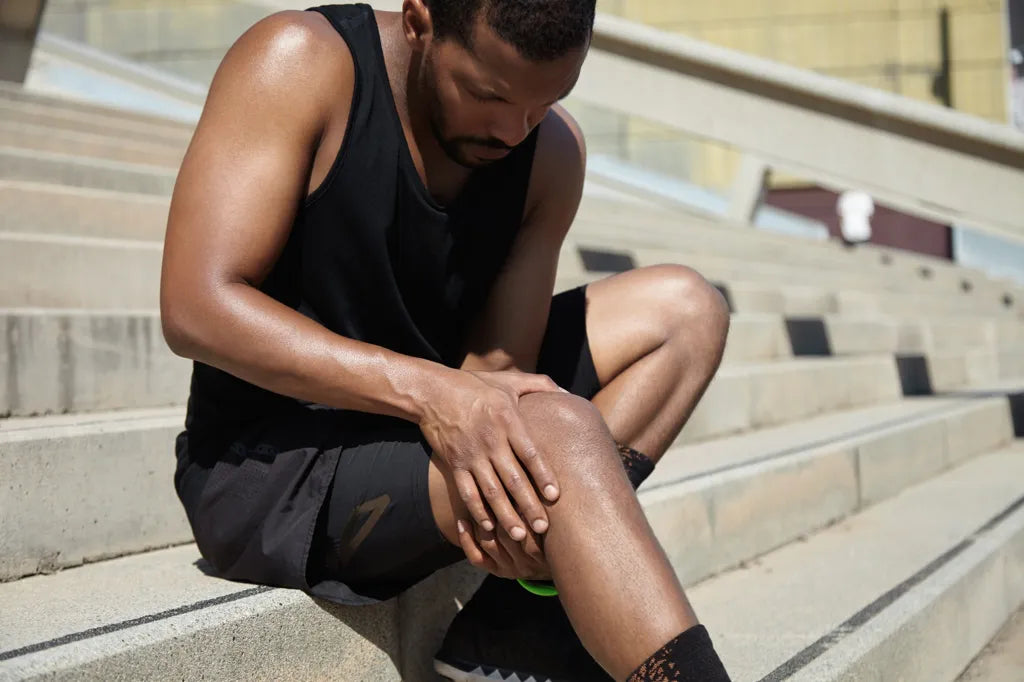How To Make Knees Stronger? Your Genes Matter!

Looking for a list of the top 10 exercises on how to make knees stronger?
You've come to the right place, but our advice won't be a one-size-fits-all routine. The truth is, your knees are one-of-a-kind, and so should your strategies for keeping them strong.
Generic exercise lists fail to account for the crucial role your genes play in muscle development, recovery, and injury risk. Your DNA acts as a blueprint, influencing factors like muscle fiber type composition and how your body responds to different training styles.Some individuals may thrive with explosive, high-intensity exercises, while others see better results from endurance-focused routines. It's this genetic variation that often leads to plateaus and frustrations when following a generic program.
In this guide, we'll help you understand why a personalized approach is essential for building run fitness without hurting your knees. You'll learn how to leverage your genetic profile to optimize your training, ensuring every workout is tailored to your body's unique needs.
Why Strong Knees Matter
As the saying goes – a chain is only as strong as its weakest link. This is why you have to make sure your knees are up to the task.
Whether you’re a weekend warrior or a competitive athlete, here's why prioritizing knee strength pays dividends:
1. The Foundation of Movement
From the simplest acts like walking or climbing stairs to more complex activities like running a marathon or scoring a touchdown, our knees are crucial for almost every physical activity.
Strong and healthy knees provide a stable base for our movements. This stability translates into better performance in everything you do – whether you're an athlete pushing for a personal best (PB) or someone who wants to climb stairs without discomfort.
Sports like soccer, basketball, tennis, and volleyball require jumping, pivoting, accelerating, and decelerating - all of which need stable and functional knees to withstand the forces.
Strong knees also contribute to better overall body mechanics. They help distribute forces evenly throughout your legs, reducing strain on other joints and muscles. This means you can move more efficiently and with less risk of injury in other areas of your body.
2. Preventing Injury
Studies show that weak knees can raise injury risk not only in the joint itself but also in surrounding areas like the hips, pelvis, and lower back.
Common knee injuries associated with lack of strength are the runner’s knee (patellofemoral pain), tendinitis, cartilage tears, and ligament sprains or tears.
Strong muscles around the knee joint act like shock absorbers, cushioning the impact of your movements. This is especially important for high-impact activities like running or jumping.
Building muscular endurance around the knees better stabilizes the joint and reduces overload on the connective tissue.
3. Enhanced Performance
Stronger knees translate to better performance.
Increased knee and hip stability allows you to accelerate faster, change direction quicker, jump higher, and run more economically.
Strong knees also contribute to better endurance. They help maintain proper form for longer periods and delay fatigue. This means you can train harder and perform better for extended durations while maintaining speed, agility, and form.
How Genes Shape Knee Strengthening and Point To Areas Of Weakness
Have you ever wondered why certain knee-strengthening exercises seem really effective for some people but not for others? Why can your training buddy easily squat heavy weights while you struggle with knee pain?
While factors like previous injuries and muscle imbalances from poor biomechanics can play a role, a big part of the answer actually lies in your genes.
That's right - the genetic hand you were dealt significantly impacts how your body responds to different types of exercise.
Body's Blueprint for Performance Roadmap!
Genes provide the instructions for making proteins that influence factors like muscle fiber type, injury risk, recovery ability, and more. This genetic "blueprint" explains why people respond differently to the same workout regimen.
For example, the ACTN3 gene helps determine the type of muscle fibers that make up your muscles. Generally, there are two types:
-
Slow twitch: Better suited for endurance activities
- Fast twitch: Provide explosiveness and strength
Your unique ACTN3 gene variant affects your natural muscle fiber composition. Understanding whether your genetics lean more towards slow or fast twitch-dominant muscles can guide you in selecting workouts that work with your body and not against it.
Collagen Creators: COL1A1, COL3A1, and COL12A1
Beyond muscle fiber dominance, genes also influence the health of connective tissues like tendons and ligaments around your knee joint. Research shows that variations in these genes impact injury susceptibility when ramping training too aggressively or performing workouts that your body is not accustomed to:
Individuals (specifically female athletes) with the AA genotype of COL12A1 have a higher anterior cruciate ligament (ACL) tear risk.
The TT genotype of COL1A1 is linked to a protective benefit against cruciate ligament ruptures (CL) and/or Achilles tendon ruptures.
Certain mutations in the COL3A1 gene are linked to spontaneous Achilles tendon ruptures.
So, if your genetics make you more prone to tendon and ligament injuries, gradually increasing your running training load and incorporating run-specific strengthening exercises can be critical for maintaining knee health and reducing injury risk.
Adaptation and Repair Squad: MMP3, CKM and VEGFA

Other genes influence how your body adapts and repairs tissues during training:
MMP3:
MMP3 contributes to remodeling of tendons and ligaments over time.
VEGFA:
VEGFA assists with repair and recovery processes like skeletal muscle repair.
GDF5:
GDF-5 has a great impact on ligament health and stability which influences its role in knee injury risk, especially in semi-professional and amateur athletes.
Accounting for such genetic differences can optimize training frequency/intensity and ensure adequate rest between high-load workout days!
Inflammation and Recovery Regulators: IL-6, TNF, SOD2, and More
Variations in post-workout inflammation and recovery rates can significantly impact your progress with generic run and strength training programs.
- IL-6, IL-6R, TNF-A, and CRP:
Key genes like IL-6, IL-6R, TNF-A, and CRP can modulate inflammation response. This can affect how quickly your muscles recover after a workout, which can impact your ability to strengthen your knees effectively.
- SOD2 :
Certain variations in the SOD2 genotype can lead to a significant increase in post-exercise markers such as advanced oxidation protein products (AOPP), lactic dehydrogenase (LDH), etc. This suggests that the SOD2 genotype may influence susceptibility to oxidative stress and muscle damage following exercise.
Thus, understanding your genetic predispositions can help you tailor your training program to optimize recovery and reduce the risk of inflammation-related injuries.
Why Your Knees Deserve a Personal Trainer (Not a Generic Routine)
When it comes to knee health and injury prevention, one-size-fits-all approaches simply don't cut it. We all have unique genetic makeups that influence strength, repair, recovery, and more.
The Myth of the Universal Knee Fix
A systematic review and meta-analysis found that genes explained up to 72% of the differences in exercise response within individuals.
What does that mean for you?
What works for your running partner's knees might not work for you.
Generic run training programs and strengthening exercises often fail to account for genetic factors that influence your unique response to exercise. They assume that a “uniform” program will strengthen knees effectively if you just “push through.”
However, individual results can vary widely when following similar workout programming due to genetic factors. That's why it's important to recognize and account for these differences.
What Can You Do Instead?
It's time to put a stop to compromising your knees with blanket exercises.
You deserve a smarter, safer approach to maximize fitness returns and minimize injury risk (sore knees).
Gene-informed performance tracking apps like GENEFIT can assess your genetic profile and offer custom recommendations to prevent knee injury and build resilience. This can indirectly help strengthen knees.
With expert-designed genetics-based training and insights, you can:
- Increase fitness levels safely and efficiently
- Target weak points effectively
- Avoid potentially harmful exercises
- Optimize your running training intensity and frequency
- Reduce injury risk while maximizing gains
Its advanced technology also tracks your session loads and monitors injury risk in real-time, guiding you on how to challenge your body appropriately as you progress.
The GENEFIT Approach For Stronger Knees

Now that you know genetic insights can give you that athletic edge and help build knee resilience, how do you use it to enhance your running routine?
That's where gene-based apps and companies come into the picture.
Apps like GENEFIT combine gene analysis with advanced algorithms to provide personalized training recommendations.
Through a simple genetics test, GENEFIT analyzes key gene variants related to performance, injury risk, recovery, nutrition, and other pathways.
Based on the results, GENEFIT provides:
- Personalized run training plans
- Real-time feedback via Session Scores
- Guidance on optimal recovery strategies
- Continual progress tracking
- Injury alerts to help improve long-run performance
- Daily tips and recommendations based on your training for the day and tissue health scores
These insights eliminate all guesswork and power real-time algorithmic training plans tailored to your genetic profile.
What GENEFIT's Gene-Based Recommendations Look Like
GENEFIT offers personalized recommendations (Steps to Success) that are as unique as your DNA.
Injury Risk Mitigation, Recovery, and Recovery
If your genetics indicate a higher muscle or connective tissue injury risk, GENEFIT may generate nutritional and lifestyle recommendations to support recovery and repair
Nutritional Tips
GENEFIT's Steps to Success feature provides highly personalized daily nutritional tips tailored to each individual user. Unlike generic recommendations, S2S generates unique advice based on two key factors:
- Your daily training load balance
- Your tissue health scores
This means the nutritional guidance you receive is specifically designed to support your body's current needs, taking into account your recent activity levels and any potential injury risks.
Overall Benefits
By accounting for your genetic tendencies, GENEFIT’s recommendations allow you to train smarter, move better, prevent injury, and enhance performance—no matter your goals.
Power Up Your Knees: Take Control with Personalized Training
The point is, when it comes to knee strengthening, knowledge truly is power.
So, what works for your training buddy might not work for you.
The best way to go about making your knees stronger is to understand the role your genes play as the blueprint for your muscles and connective tissues. Then leverage these insights to take your training to the next level through science-backed recommendations.
Let GENEFIT help you strengthen your knees efficiently by revealing how they’re meant to move based on your DNA.
With knowledge of your genetic predispositions, reinjury becomes preventable, and hitting new PRs easier!
Frequently Asked Questions (FAQs)
My knees feel weak and unstable. How can I strengthen them without causing more pain?
Low-impact exercises along with targeted stretches for lateral knee pain, can help improve knee strength without exacerbating pain. However, genetics also play a role in knee stability. GENEFIT can highlight areas of weakness and guide your run training to ensure safe and effective load progression.
What are the most common knee injuries for athletes?
ACL tears, runner's knee, IT band syndrome, and cartilage tears are frequent knee injuries for athletes. Understanding your genetic risk helps prevent these through tailored knee joint strengthening and stability exercises.
How can I strengthen my knees to prevent future injuries?
Your genetic profile from GENEFIT provides insights into whether you may be predisposed to muscle or connective tissue injuries in the knee. Strengthening exercises like leg extensions and hamstring curls build overall knee resilience, while your genetic results can guide training modifications to help prevent the types of knee injuries you are most susceptible to.
How to improve form during knee strengthening exercises?
Here are some quick tips to achieve proper form while exercising knee muscles and joints:
For squats:
Imagine you're pushing the ground away from you. This mental cue helps engage your leg muscles correctly.
During lunges:
Keep your front knee aligned with your ankle. Think of your leg as a pillar of strength.
For deadlifts:
Maintain a neutral spine. Visualize a straight line from your head to your tailbone.
What is GENEFIT, and how can it help me strengthen my knees?
GENEFIT is an innovative app that uses your genetic information to create personalized training plans and offers science-backed recommendations. This targeted approach helps you optimize your training, build stronger knees, and reduce your risk of injury, all based on your individual genetics.
I feel stuck in my fitness journey due to weak knees. What can I do to improve?
Weak knees can be frustrating for runners, but proper training structure can help prevent injuries and improve overall fitness. GENEFIT offers personalized run training plans and fitness based on your genetic profile to help you optimize your running routine.
By using GENEFIT's recommendations, you can avoid ramping up your workouts too quickly or suddenly, which reduces the risk of knee injuries. This tailored approach helps you progress safely in your fitness journey, allowing you to build strength and endurance without overstraining your knees.
Is it safe to strengthen my knees if I have arthritis?
Yes, low-impact knee strengthening exercises can safely relieve arthritis knee pain and instability. Focus on proper form and listen to your body to avoid added inflammation.



